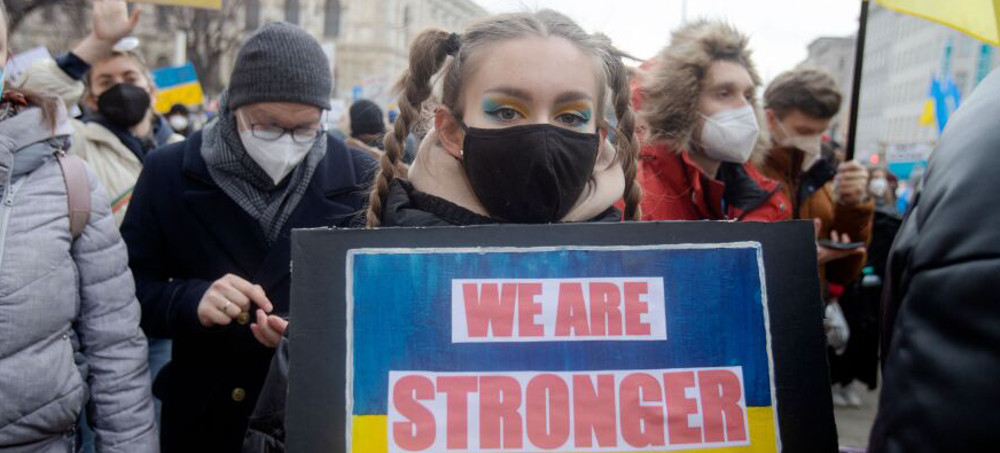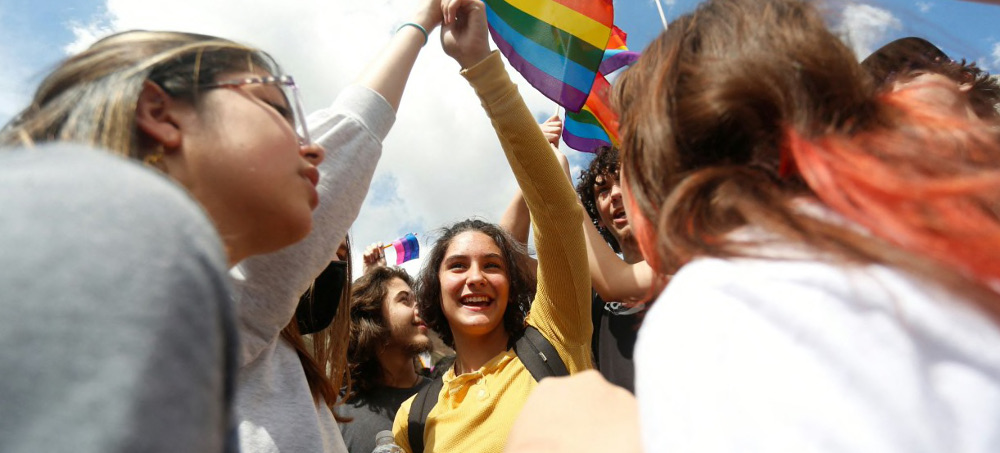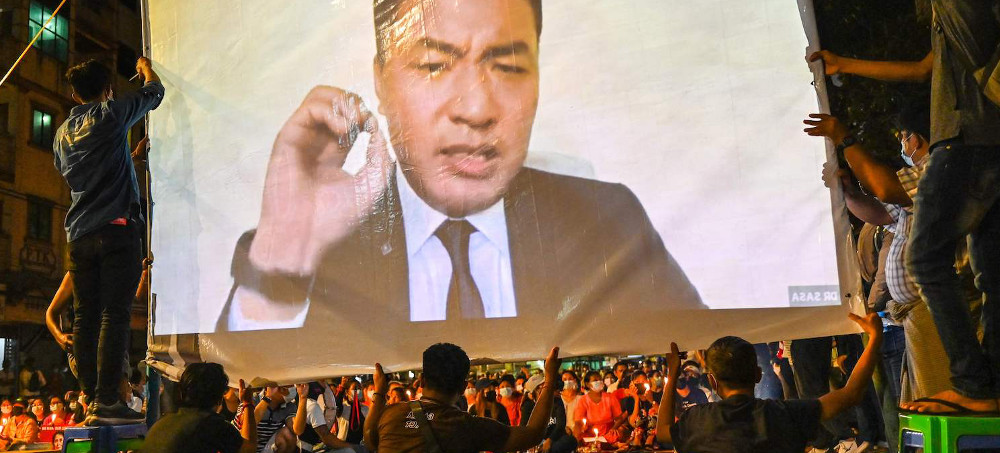Cannot Overstate the Importance of a Good Start
In fundraising a good start is the key to success. Today is day-one of our March fundraising drive. Can we get RSN paid for? That’s the question. It sounds easy but it’s proving to be quite difficult.
Who can get it started?
Marc Ash
Founder, Reader Supported News
If you would prefer to send a check:
Reader Supported News
PO Box 2043 / Citrus Heights, CA 95611
Follow us on facebook and twitter!
Live on the homepage now!
Reader Supported News
A majority of people in Russia get their news from state television, which depicts their country not as the aggressor in Ukraine but as a victim of the West.
Meanwhile, pedestrian traffic around the square flowed smoothly and speedily. People went in and out of the Metro and a three-story H&M store. They did not stop and stare at the mute scenes of arrest. They did not seem to notice, and the not-noticing did not appear effortful. It seemed, rather, that the Muscovites going about their business and the young women being arrested inhabited different realities. The protesters lived in a world where Russia was waging a brutal, inexplicable war in Ukraine, where it was bombing residential neighborhoods in Kharkiv, Ukraine’s second-largest city. The rest of the people in the square lived in a world where this war did not exist.
[Your support makes our on-the-ground reporting on the war in Ukraine possible. Subscribe today » ]
A majority of Russians get their news from broadcast television, which is fully controlled by the state. “This is largely a country of older people and poor people,” Lev Gudkov told me. Gudkov is the director of the Levada Center, which was once Russia’s leading public-opinion-research organization and which the state has now branded a “foreign agent.” There are more Russians over the age of forty-five than there are between the ages of fifteen and forty-four. Even those who get their news online are still unlikely to encounter a narrative that differs from what broadcast television offers. The state continues to ratchet up pressure on the few surviving independent media outlets, blocking access to their Web sites, requiring them to preface their content with a disclaimer that it was created by a “foreign agent,” and, ultimately, forcing them to close. On Thursday, the radio station Echo of Moscow and the Web-based television channel TV Rain, both of which had had their sites blocked earlier in the week, decided to stop operations. What the vast majority of Russians see, Gudkov said, are “lies and hatred on a fantastical scale.”
State television varies little, aesthetically and narratively, from channel to channel. Aside from President Vladimir Putin interrupting regular programming in the early hours of February 24th to announce a “special military operation” in Ukraine, the picture has changed little since before the war. There is no ongoing live coverage, no acknowledgment that what’s happening is extraordinary, even as Russian bombs fall on Ukraine’s residential areas and the Russian economy enters a tailspin. The news lineup, too, changes little day to day. On Thursday, the 7 A.M. newscast on Channel One lasted six minutes and contained six stories: a new round of Russian-Ukrainian peace talks in which Russia was eager to seek “common ground”; the “shelling of the Donetsk People’s Republic by the Ukrainian armed forces,” from which “twenty-five civilians have died.” A segue: “And now let’s look at footage from the Chernigov region, an area that is now controlled by the Russian armed forces. . . . Civilians continue driving around on their regular business.” (There were no civilians in the footage shown, only an endless sequence of armored vehicles.) Then: “Russia has prepared more than ten and a half thousand tons of humanitarian aid for the people of Ukraine”; “The West is pumping Ukraine full of offensive weapons”; “Aeroflot is organizing charter flights to return Russian citizens stranded in Europe.” Then the young male host announced, “The next scheduled program is ‘Good Morning.’ ” There was no mention of Kharkiv or Kyiv, which had been bombed the day before. Most remarkably, there was no mention of Russian military casualties, even though on Wednesday the defense ministry had acknowledged four hundred and ninety-eight deaths. (Ukraine has put Russian military losses at more than ten times that number.)
Gudkov summed up the world view shaped by Russian television: “Russia is a victim, as it has been ever since the Second World War. The West aims to establish world domination. Its ultimate goal is to humiliate Russia and take possession of its natural resources. Russia is forced to defend itself.” Days before the full-scale invasion began, the Levada Center asked Russians who they thought was responsible for the mounting tensions in Ukraine. Three per cent blamed Russia, fourteen per cent blamed Ukraine, and sixty per cent blamed the United States.
The government has banned the use of the words “war,” “aggression,” and “invasion” to describe its “special military operation” in Ukraine. Media outlets that violate these bans face fines and closure. On Friday, the upper chamber of parliament passed a bill making the dissemination of “false information” about the conflict punishable by up to fifteen years in prison. The bill was responsible for TV Rain deciding to stop broadcasting on YouTube: the risks of calling things what they are have become too high—and the cost of trying to walk a fine line, as TV Rain had been doing, was morally unsustainable. Novaya Gazeta, the newspaper edited by Dmitry Muratov, a winner of the Nobel Peace Prize, took a vote among people it calls its “co-conspirators”—those who support the paper through private donations. Sixty-four hundred and twenty people have voted; about ninety-four per cent of them asked the paper to submit to the censorship requirements and continue publishing.
Most of Russia’s propaganda language is plainly Orwellian. After a few days, newscasts were consistently referring to the war as an “operation to restore peace.” On Tuesday night, when the TV Rain Web site was blocked, the channel was broadcasting a story about how the government, working through ad agencies, was offering to pay bloggers and TikTokers to post talking points about the war. “All posts should be accompanied by #LetsGoPeace and #DontAbandonOurOwn,” the offer began. Among the talking points: “We are calling for peace, and it’s unfortunate that these are the means we must use to achieve it.”
On March 1st, schools around the country held special social-studies classes on the war in Ukraine. The online publication Mediazona, another independent news organization that has been branded a “foreign agent,” obtained a script sent out by the education ministry. Its F.A.Q. section begins, “Question: Are we at war with Ukraine? Could this have been avoided? Answer: We are not at war. We are conducting a special peacekeeping mission, the goal of which is to contain the nationalists who are oppressing the Russian-speaking population.”
In “The Language of the Third Reich,” the German-Jewish writer Victor Klemperer described the effect of propaganda as “blurring” reality. When the Russian narrative of the war in Ukraine is not Orwellian, it is Klempererian. The state’s twenty-four-hour news channel, Rossiya 24, drones on about villages and towns that have been “liberated,” but they name small towns that are unfamiliar to most viewers. The pictures onscreen often contradict the words spoken over them. On Thursday morning, a reporter on Rossiya 24 told of directly observing an unexploded Ukrainian rocket wedged in the floor of “an apartment on Lenin Street.” The accompanying image was that of an empty street in an unidentifiable village. “It’s not just the arguments—it’s the uninterrupted flow” of propaganda, Gudkov said. “Viewers are just caught in this flow.”
Although there is supposed to be no war, there is a sense of constant threat and aggrievement. In 2014, when Russia first invaded Ukraine, an army of propagandists struggled to find the right framing. Finally, they unleashed the war language that Russians know best: that of the Second World War. They called Ukrainians fascists—“UkroNazis”—and accused them of genocide. In this story, the 2014 revolution in Ukraine was carried out by Nazis who want to exterminate the country’s Russian-speaking population, beginning with the eastern region of the Donbass. A slide presentation for students in grades six through eight, also obtained by Mediazona, ends with a sequence of questions: “How do you interpret the word ‘genocide’? Why is it applicable to the situation in the Donbass? . . . Think about history. Russia has always guaranteed Ukraine’s security and independence. Can this situation be described as a senior partner helping a junior one?”
On an episode of a political talk show that has aired several times since the war began, a group of six pundits discussed plans for the “de-Nazification” of Ukraine after it is “liberated.” Their consensus seemed to be that most Ukrainians were not bad people, just stupid and brainwashed by NATO, fascists, and imperialist forces who want to return Russia to the status of “a colony exploited by the West.” Speaking on Rossiya 24, on Thursday morning, Eduard Basurin, the deputy head of the Donetsk People’s Republic Militia, spoke about Mariupol, a Ukrainian city that was then surrounded by Russian troops. “Mariupol has become a concentration camp,” he said. He claimed that Ukrainian troops had herded civilians into the city’s steelworks, which had been planted with explosives: “If the city’s defenses are breached, they will blow the factory up and then use the video footage to say that the Russian artillery is killing civilians. Can you imagine the cynicism?” The next story: “The Russian Defense Ministry’s convoy delivers critically needed humanitarian cargo to residents of the Kharkiv region.” The one after that lamented the West’s ongoing attack on free speech, citing the United Kingdom’s newly announced ban on the Russian state-run English-language channel RT. (By Friday, Russia had blocked Facebook, the BBC, Radio Liberty, and the Russian-language news organization Meduza.)
The nice thing about a war that’s not a war is that it’s easy to look away—without looking away from the television. The airwaves fill with reassurances: Russian banks don’t need SWIFT; Europe’s sanctions only mean that fuel prices will go up in the West; the Russian billionaire Roman Abramovich is selling Chelsea Football Club not because he might soon face sanctions but because the club kept losing money; the foreign minister, Sergey Lavrov, has promised that “our Western partners will get over themselves.” Peace and prosperity are just around the corner.
 A woman holds a sign reading "We are stronger than he thinks" during Saturday's demonstration in Vienna against the Russian invasion of Ukraine. (photo: Alex Halada/AP)
A woman holds a sign reading "We are stronger than he thinks" during Saturday's demonstration in Vienna against the Russian invasion of Ukraine. (photo: Alex Halada/AP)
More than 280 U.S. lawmakers joined a call with Ukrainian President Volodymyr Zelenskyy, in which he asked for a ban on buying Russian goods as well as more defense aid for Ukraine. A cease-fire to provide safe evacuation routes fell apart hours after it was issued.
The new travel advisory was issued Saturday over heightened security concerns in the country as Russian military forces carry out an “unprovoked and unjustified attack” in Ukraine, the State Department said.
The alert warned of “the potential for harassment against U.S. citizens by Russian government security officials, the Embassy’s limited ability to assist U.S. citizens in Russia, COVID-19 and related entry restrictions, terrorism, limited flights into and out of Russia, and the arbitrary enforcement of local law. U.S. citizens should depart Russia immediately. “
As foreigners make plans to exit the country, the State Department noted a growing number of flight cancellations into and out of Russia, reports of cash shortages, and that “some credit and debit cards may be declined as a result of sanctions imposed on Russian banks.”
The State Department's prior travel advisory, issued on Friday, said American citizens should "consider" departing Russia immediately through the available commercial options. On Feb. 28, U.S. officials allowed the voluntary departure of non-emergency staff at the U.S. Embassy in Moscow and their family members.
 Sen. Elizabeth Warren. (photo: Getty)
Sen. Elizabeth Warren. (photo: Getty)
In a statement released late Friday, she called out market makers JPMorgan Chase & Co. and Goldman Sachs Group Inc. following a Bloomberg report that the two banks had been purchasing beaten-down bonds. Banks routinely scoop up debt because clients asked them to, or because they expect to find ready buyers.
Read more: Wall Street Is Pouncing on Russia’s Cheap Corporate Debt
JPMorgan analysts also published a note recommending that investors boost holdings of Russian-linked debt to take advantage of a “recovery play” stemming from the sell off that has accompanied the country’s invasion of Ukraine.
“Giant Wall Street banks like JPMorgan and Goldman Sachs never miss out on an opportunity to get richer even if it means capitalizing on Russia’s invasion of Ukraine and undermining sanctions placed on Russian businesses,” said Warren, a Massachusetts Democrat.
Read more: JPMorgan Analysts Tout Russian Company Debt ‘Recovery Play’
Representatives for Goldman Sachs and JPMorgan declined to comment on the Bloomberg report that they had been buying up Russian bonds.
 A Hertz at Seattle-Tacoma International Airport. (photo: George Rose/Getty)
A Hertz at Seattle-Tacoma International Airport. (photo: George Rose/Getty)
Now Hertz has to publicize its number of theft accusations. In a ruling Wednesday, a federal judge in Delaware sided with the request from attorneys for 230 customers who say they were wrongly arrested.
The total still depends on whom you ask. Hertz said it reports to police 0.014 percent of its 25 million annual rental transactions — or 3,500 customers. Attorneys for the renters said they believe the number is closer to 8,000.
Francis Alexander Malofiy, one of those lawyers, said Hertz’s tendency to report missing cars to police without investigating first is unacceptable, either way.
“This is not a question of if it’s happening. It’s a question of how many people it’s happening to,” he said Friday in an interview.
Hertz, which has been battling these allegations since 2019, maintains that it reports renters to police only after “exhaustive attempts” to reach them.
“The vast majority of these cases involve renters who were many weeks or even months overdue returning vehicles and who stopped communicating with us well beyond the scheduled due date,” the company said in a statement.
At several points in the coronavirus pandemic, securing a rental car has resembled a nightmare, even absent potentially false theft allegations. Car shortages have made customers desperate for vehicles as prices soared in tandem.
Hertz, specifically, has faced additional problems: It emerged from bankruptcy in June months after getting hit with a lawsuit alleging it had withheld a time-stamped receipt that could prove a man innocent of murder. Then, in a viral Twitter thread, a different customer posted a scathing letter she had written to the company to complain about her “Kafkaesque customer service” experience.
On Thursday, Julius Burnside described what he said was his experience renting a car from Hertz in 2017.
“Turned it in, paid for it, kept my receipts, went about my life, found out there was a warrant for my arrest and subsequently went to jail,” he told MSNBC.
Other people told “Inside Edition” that they were similarly arrested after Hertz accused them of stealing cars for which they had paid. A charge of felony auto theft against Paul-Anthony Knight was ultimately dismissed, the TV program reported, but not before he served jail time.
“I was thrown to the ground, I was arrested and I was locked up for over a week,” Knight, of the Atlanta area, told “Inside Edition” last month.
Colorado resident Drew Seaser told CBS News he was stopped by customs officers at an airport and informed there was a warrant for his arrest in Georgia, where Hertz alleged he had stolen a rental car. Seaser said he had never been to Georgia or rented a vehicle from Hertz.
Those kinds of false theft allegations have not abated, attorneys for the customers said.
“Despite active litigation on false-police-report claims, Hertz customers continue to be arrested and that ‘tiny fraction’ continues to grow,” the lawyers wrote in court filings, citing previous comments from a company lawyer that a “tiny fraction” of customers is wrongfully arrested.
The problem sometimes arises when Hertz cannot find one of its cars in a physical parking lot or its computer system, Malofiy said. So, he said, the company reports the vehicle missing.
Other times, Malofiy said, the confusion is caused by a customer swapping cars during their rental period or extending the time frame. If the credit or debit card charge fails to process correctly, he said, Hertz’s system generates a theft report.
Malofiy said the company does not update its police reports if a payment ultimately processes — leaving customers to flounder in the criminal justice system. In 2020, a spokesperson for Hertz told the Philadelphia Inquirer that a stolen-vehicle report “was valid when it was made” and that it was “up to law enforcement to decide what to do with the case.”
The company’s method of dealing with missing cars amounts to offloading responsibility for its inventory to taxpayer-funded law enforcement, Malofiy said.
“We’re having police act as a strong arm for private corporations and private vehicles,” he said, “when this is not what taxpayer dollars are supposed to be used for.”
 Hillsborough High School students protest the "Don't Say Gay" bill in Tampa, Florida, on Thursday. (photo: Octavio Jones/Reuters)
Hillsborough High School students protest the "Don't Say Gay" bill in Tampa, Florida, on Thursday. (photo: Octavio Jones/Reuters)
Protesters: “We say gay! We say gay! We say gay! We say gay! We say gay! We say gay!”
The bill would ban discussions of sexual orientation and gender identity in schools. Meanwhile, in Iowa, Republican Governor Kim Reynolds has signed a new law banning transgender girls and women from school sports. Iowa is the 11th state to ban transgender athletes. Legal challenges are expected.
 Protesters watch as a video showing shadow government spokesman Dr Sasa is projected on a screen in Yangon in March last year. He and several other key figures in the National Unity Government have been stripped of their Myanmar citizenship. (photo: AFP)
Protesters watch as a video showing shadow government spokesman Dr Sasa is projected on a screen in Yangon in March last year. He and several other key figures in the National Unity Government have been stripped of their Myanmar citizenship. (photo: AFP)
Ousted lawmakers formed the National Unity Government weeks after the military’s power-grab in February last year, and have vowed to overturn the coup
The NUG has since been declared a “terrorist” organisation by the junta.
Those stripped of citizenship include spokesman Dr Sasa — who goes by one name — minister for foreign affairs Zin Mar Aung, home minister Lwin Ko Latt and human rights minister Aung Myo Min.
The group had “violated the existing laws of the State and … found to be committing acts that could harm the interests of Myanmar”, according to a junta notice in the state newspaper Global New Light of Myanmar.
The writer Ei Pencilo and prominent activists Min Ko Naing and Ei Thinzar Maung had also had their citizenship revoked, it said.
“Similar perpetrators will be identified and prosecuted,” the notice from the military added.
The NUG holds no territory and has not been recognised by any foreign government. Many of its members are in hiding or exile.
Aung San Suu Kyi — nominated as the head of the shadow government — has been detained since the coup and faces a barrage of charges that could put her in jail for more than 150 years.
Myanmar has been in turmoil since the coup and a subsequent military crackdown on dissent that a local monitoring group says has killed more than 1,600 people.
 Black bear near Panthertown in North Carolina. (photo: Steve Allen/Alamy)
Black bear near Panthertown in North Carolina. (photo: Steve Allen/Alamy)
Officials to allow bear-hunting in three sanctuaries due to ‘increased human-bear interactions’ – but opponents say plan is a ‘disaster’
The North Carolina commission voted to allow bear hunting in three bear sanctuaries, encompassing an area of 92,500 acres of mountainous forest in the southern US state. The sanctuaries, established to protect and preserve North Carolina’s black bear population, are set to open to hunters later in 2022, despite thousands of people signing a petition against the move.
Bear hunting has been banned in North Carolina’s Panthertown-Bonas Defeat, Standing Indian and Pisgah Bear sanctuaries since 1971. The number of black bears in the state has since grown from fewer than 1,000 to about 25,000, according to the wildlife commission.
In a January public hearing, the commission said the US Forest Service, the federal agency that oversees America’s 154 national forests, had requested that hunting be allowed in the three sanctuaries “due to increased human-bear interactions”.
The commission voted in favor of the proposal in late February, in defiance of opponents who say hunting will not reduce human-bear encounters.
“It will definitely not target the actual bears involved in the original complaint of ‘increased bear-human interactions’,” said Bill Lea, a North Carolina-based nature photographer and retired US Forest Service assistant district ranger.
“Instead, the plan will target many of the younger bears who have just started life on their own away from their mothers and who have not yet developed the skills to elude the packs of vicious dogs and hunters. The indiscriminate killing of bears never addresses the problem of individual bear behavior.”
The American black bear is native to North America, where it can be found across Canada and in much of the western and eastern US, including North Carolina, California and New York. The bears, which can weigh up to 660lb (300kg), are omnivores who are normally wary of humans, but can develop a taste for food designed for humans if it is left easily accessible.
A petition, addressed to the wildlife commission and signed by almost 8,000 people, said it was mostly humans who are to blame for bear encounters.
“We as humans need to address and acknowledge that our actions are changing bear behavior and causing conflicts. Managing our habits, understanding how they impact bears, and adjusting our activities will solve bear-human conflicts, not hunting,” the petition said.
Friends of Panthertown, a non-profit group which protects and maintains parts of the Panthertown-Bonas Defeat bear sanctuary, said 2,744 people had commented on the North Carolina commission’s bear hunting proposal, with 86% of people opposed to the changes.
“Bear hunting has no place in Panthertown,” said Jason Kimenker, executive director of Friends of Panthertown. “This is their natural, wild habitat. These forests are their territory. This is their home. We are the visitors here and we all have a responsibility to continue to protect the bears.”
Friends of Panthertown said human-bear interactions had dropped after it installed “bear-proof food storage vaults”. Local groups say they will continue to lobby against bear hunting, but as it stands hunters will be allowed access to the three huge sanctuaries this fall.
“I don’t think we would be fully human if we did not feel compassion for bears and other animals as individuals,” Brad Stanback, one of the members of the North Carolina wildlife resources commission, told the Asheville Citizen Times.
The commission did not respond to a request for comment. Peta was among the national organizations to criticize the move.
“Peta reminds the North Carolina Wildlife Resources Commission that bears are not living targets for gun nuts, that they can manage their own populations based on available resources, and that there are always humane solutions for dealing with real or perceived conflicts with wildlife,” the group said in a statement.
Animal protection groups said proper storage of food and scented items was the way to reduce encounters, along with better education about how hikers and visitors can prevent visits from curious bears.
“North Carolina cannot hunt its way out of human-bear conflicts as an excuse for a trophy,” Kitty Block, president and chief executive of the Humane Society of the United States, said.
“Black bears are slow to reproduce and susceptible to overkill from both legal hunting and poaching. They provide vast benefits to their ecosystems, and destroying them instead of implementing proper solutions, is a disaster.
“If black bears are to survive and thrive, we must learn to adapt and share our world with them.”
Follow us on facebook and twitter!
PO Box 2043 / Citrus Heights, CA 95611



No comments:
Post a Comment
Note: Only a member of this blog may post a comment.